HVAC systems are often viewed as the unsung heroes of home comfort, overshadowed by more immediate home improvements. Yet, they carve their niche with unmatched efficiency and adaptability. This unique character sets them apart in the vast world of home maintenance, offering a distinct experience that distinguishes HVAC solutions as a category in their own right.
Key types of HVAC systems include Central Air Conditioning, Ductless Mini-Split Systems, Heat Pumps, and Furnaces, each known for their distinct advantages. Single Room Air Conditioners also stand out, offering a more focused but efficient choice for temperature control. Going a bit deeper, each type of HVAC system presents its own set of benefits, installation processes, energy efficiencies, and recommendations for maintenance.
The following sections will explore these aspects in detail, providing a richer understanding of what makes each HVAC system a crucial component of home comfort worldwide.
What is HVAC?
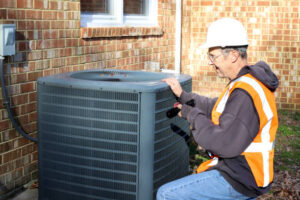
HVAC stands for Heating, Ventilation, and Air Conditioning. It is a system used to keep the inside of homes and buildings comfortable. HVAC systems control the temperature, humidity, and air quality to make spaces more livable.
They include different types of equipment like furnaces, air conditioners, and heat pumps. HVAC systems can be big for whole buildings or small for just one room. They help people stay warm in winter and cool in summer.
Plus, they make sure the air is clean to breathe.
Types of HVAC Systems
There are several types of HVAC systems, each designed to meet different needs. Central Air Conditioning systems cool the whole home efficiently. Ductless Mini-Split Systems offer flexibility by cooling individual rooms without the need for ductwork.
Heat Pumps stand out for their versatility, providing both heating and cooling options. Furnaces, available in gas, electric, or oil versions, are a traditional choice for heating. Each system has its own set of advantages, whether it’s energy efficiency, cost savings, or the ability to precisely control the temperature in specific areas of your home.
Choosing the right HVAC system involves considering factors like home size, climate, and personal preferences to ensure optimal comfort and efficiency.
Central Air Conditioning
Central Air Conditioning cools your entire home through a network of ducts, providing a uniform temperature throughout.
Whole-Home Cooling
Whole-Home Cooling is achieved using systems like central air conditioners, ensuring every room stays comfortable.
Ductless Mini-Split Systems
Ductless Mini-Split Systems offer targeted cooling (and heating) without the need for extensive ductwork, perfect for specific areas or additions.
Individual Room Control
With Individual Room Control, you can adjust temperatures in separate rooms, often seen in ductless systems, for personalized comfort.
Heat Pumps
Heat Pumps serve dual purposes, heating and cooling your home by efficiently transferring heat instead of generating it, making them an energy-efficient choice.
Heating and Cooling Efficiency
Heating and Cooling Efficiency focuses on minimizing energy use while maintaining comfort, achievable with modern, high-efficiency HVAC systems.
Furnaces
Furnaces provide warmth to your home by burning fuel, available in gas, electric, or oil options, each with unique benefits.
Gas, Electric, and Oil Options
Gas, Electric, and Oil Options for furnaces cater to different needs: gas is widely used, electric is cleaner, and oil is an alternative where gas and electricity might not be viable.
Related Readings: CENTRAL AIR CONDITIONER TYPES: FIND THE PERFECT FIT FOR YOUR HOME OR BUSINESS
Factors to Consider When Choosing an HVAC System
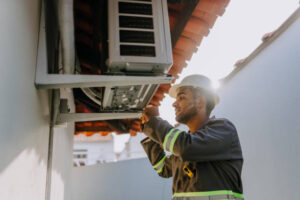
When selecting an HVAC system, consider your home’s size, including square footage and ceiling height, as these influence the system’s capacity. The climate where you live affects whether you need more heating or cooling power. Energy efficiency is crucial for reducing monthly utility costs.
Your budget matters too, weighing upfront costs against long-term savings. Also, think about the installation process and the need for professional help. Regular maintenance is key to keep the system running smoothly.
Finally, understand the total cost, including initial investment, operating expenses, and potential rebates or incentives for energy-efficient options.
Home Size
Home Size directly influences the capacity and type of HVAC system needed. Larger homes may require more robust solutions.
Square Footage and Ceiling Height
Square Footage and Ceiling Height play a critical role in selecting an HVAC system. Spaces with higher ceilings demand more from heating and cooling units due to the volume of air that needs to be regulated.
Climate
The Climate in your area is a key factor, determining whether you prioritize heating, cooling, or a versatile system capable of both.
Seasonal Temperature Extremes
Seasonal Temperature Extremes necessitate an HVAC system that can adapt to both hot summers and cold winters, ensuring year-round comfort.
Energy Efficiency
Opting for Energy Efficiency not only lowers Monthly Utility Costs but also contributes to environmental conservation. High-efficiency systems, though sometimes more costly upfront, can lead to significant savings.
Monthly Utility Costs
Monthly Utility Costs can be a deciding factor. Energy-efficient HVAC systems can offer substantial reductions in ongoing expenses.
Budget
Your Budget will guide your HVAC system choice, balancing the initial investment against the features and efficiency you desire.
Upfront vs. Long-Term Costs
Evaluating Upfront vs. Long-Term Costs is crucial. While some systems have higher initial prices, their efficiency and durability may offer greater savings over time.
Installation
Choosing the right HVAC system is just the first step. Professional Installation is critical to ensure your system works well and lasts long. Finding a Certified Contractor is key, as they have the skills and knowledge to install your system correctly.
While some homeowners might consider DIY Installation, it’s important to understand the Risks and Limitations. Mistakes can lead to inefficiencies or even damage. Professional installers can also guide you on the best system for your needs and ensure it meets all safety and building codes.
Professional Installation
Professional Installation is essential for ensuring that your HVAC system operates at its peak, providing optimal comfort and efficiency while extending the system’s lifespan.
Finding a Certified Contractor
Securing a Certified Contractor is pivotal. These professionals are equipped with the necessary training and expertise to ensure your HVAC system is installed correctly, adhering to all relevant standards and regulations.
DIY Considerations
When pondering DIY Considerations, it’s important to realistically assess your technical skills and the complexity of the HVAC system. While some aspects of installation might seem manageable, the intricacies of most systems typically demand professional attention.
Risks and Limitations
The Risks and Limitations associated with improper installation are significant. They can lead to diminished system efficiency, higher operational costs, and even pose safety risks. Opting for professional installation can help you avoid these pitfalls, safeguarding your investment.
Maintenance and Upkeep
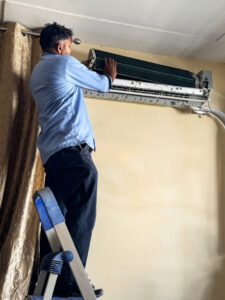
After installing your HVAC system, regular Maintenance and Upkeep are key to keeping it running smoothly. This includes Regular Cleaning of filters, coils, and ducts to ensure efficient operation. Professional Check-ups are also important, with Annual Inspections recommended to identify and fix any issues early.
Proper maintenance not only extends the life of your HVAC system but also helps maintain energy efficiency, reducing Monthly Utility Costs. Remember, a well-maintained HVAC system provides reliable comfort year-round.
Regular Cleaning
Regular Cleaning plays a pivotal role in maintaining your HVAC system’s efficiency. Regularly removing dust and debris ensures optimal performance and longevity.
Filters, Coils, and Ducts
Ensuring Filters, Coils, and Ducts are clean or replaced as needed is essential for smooth operation. This not only enhances efficiency but also significantly improves indoor air quality.
Professional Check-ups
Scheduling Professional Check-ups with a certified HVAC technician can preemptively identify and solve potential issues, preventing unexpected breakdowns and expensive repairs.
Annual Inspections
Committing to Annual Inspections allows for a comprehensive evaluation of your HVAC system, guaranteeing that it functions efficiently throughout the year and beyond.
HVAC Systems Cost
The Cost of an HVAC system encompasses more than just the initial purchase price. It includes the System Type and Size, which can affect the upfront cost and Operating Costs over time. Energy Use and Efficiency play significant roles in determining monthly utility expenses.
Additionally, homeowners should explore Potential Rebates and Incentives offered by governments and manufacturers, which can offset some costs. Understanding the balance between Upfront vs. Long-Term Costs is crucial for making a cost-effective decision.
Initial Investment
The Initial Investment encompasses both the purchase and installation costs of an HVAC system, varying significantly based on the chosen system’s complexity and capabilities.
System Type and Size
System Type and Size are pivotal factors affecting the initial cost. More sophisticated and larger capacity systems generally demand a higher upfront investment.
Operating Costs
Operating Costs extend beyond the initial purchase, covering energy consumption and routine maintenance. High-efficiency systems can substantially lower these ongoing expenses.
Energy Use and Efficiency
Energy Use and Efficiency determine the long-term affordability of an HVAC system. Systems with superior efficiency ratings consume less energy, translating to lower monthly utility bills.
Potential Rebates and Incentives
Potential Rebates and Incentives can significantly reduce the net cost of an HVAC system. These financial incentives encourage the adoption of energy-efficient models.
Government and Manufacturer Offers
Exploring Government and Manufacturer Offers can uncover opportunities for savings through tax credits, rebates, and other incentives aimed at promoting energy-efficient HVAC solutions.
Related Reading: HOW MUCH IS A NEW HVAC SYSTEM?
Energy Efficiency
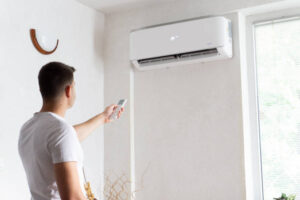
Energy Efficiency in HVAC systems is crucial for minimizing environmental impact and reducing utility bills. Systems with high SEER Ratings or Seasonal Energy Efficiency Ratios use less energy to heat or cool homes. ENERGY STAR Certification indicates that a system meets strict Environmental Protection Agency Standards for efficiency.
Choosing an energy-efficient HVAC system not only lowers monthly costs but also contributes to a healthier planet by reducing energy consumption.
SEER Rating
The SEER Rating, standing for Seasonal Energy Efficiency Ratio, quantifies the cooling efficiency of an HVAC system across the cooling season, reflecting the amount of cooling produced per unit of energy consumed.
ENERGY STAR Certification
ENERGY STAR Certification is awarded to HVAC systems that meet or exceed specific efficiency standards set by the Environmental Protection Agency, indicating superior energy performance.
Environmental Protection Agency Standards
Environmental Protection Agency Standards define the benchmarks for energy efficiency and environmental stewardship that HVAC systems must achieve to be recognized as energy-efficient and environmentally friendly.
Related Readings: UNLOCK COMFORT: THE MOST ENERGY-EFFICIENT HVAC SYSTEMS
Brands and Warranties
When choosing an HVAC system, the brand is a significant factor as it often reflects quality, reliability, and customer satisfaction. Reputable brands are usually backed by positive consumer reviews and strong industry ratings, providing a level of assurance in your investment. Equally important are the warranties offered, which vary in length and coverage.
These warranties can cover everything from parts to labor, offering peace of mind and protection against unexpected repairs. Carefully considering both the brand and the warranty terms can lead to a more informed and satisfactory purchase.
Reputable Brands
Reputable Brands stand out for their commitment to quality, durability, and customer satisfaction, making them a preferred choice among homeowners and professionals.
Consumer Reviews and Industry Ratings
Consumer Reviews and Industry Ratings offer valuable insights into the real-world performance and reliability of HVAC systems, guiding potential buyers in their decision-making process.
Warranty Length and Coverage
The Warranty Length and Coverage details are important to consider, as they can significantly impact the long-term value and protection of your investment in an HVAC system.
Parts and Labor
Comprehensive warranties that include Parts and Labor are particularly beneficial, ensuring that both the replacement parts and the service fees are covered, thereby minimizing out-of-pocket expenses for repairs.
In Summary
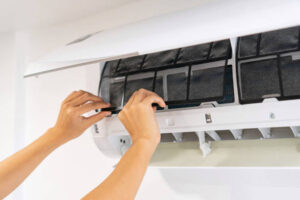
Selecting the right HVAC system is a crucial step towards ensuring year-round comfort and energy efficiency in your home. By understanding the different types of systems, considering factors like home size, climate, and budget, and prioritizing professional installation and regular maintenance, you can make an informed decision that meets your needs. Remember, a well-chosen and properly maintained HVAC system not only enhances your living environment but also contributes to long-term savings and sustainability.
Ready to transform your home’s comfort and efficiency? Explore our Callidus Air top-rated HVAC systems and find the perfect fit for your needs. Contact us today!

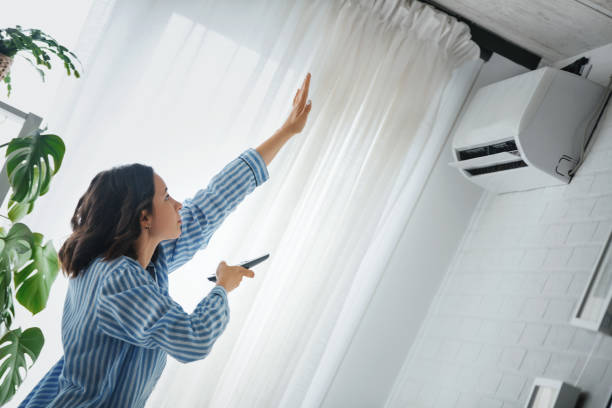
Pingback: What is HVAC? Unveiling the Unsung Hero of Indoor Comfort - Callidus Air